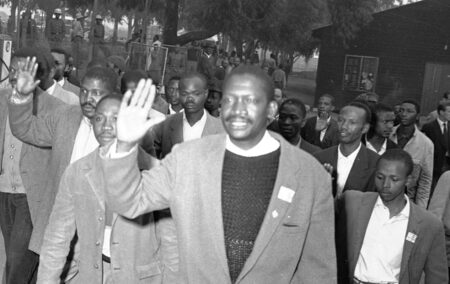As we approach the centenary of Robert Mangaliso Sobukwe on December 5, 2024, it’s vital to reflect on his remarkable consistency as a politician and philosopher in South Africa’s modern history.
Sobukwe’s political and ideological beliefs, formed during his student days at Fort Hare University in the 1940s, remained steadfast until his death in the 1970s. His commitment to honesty and integrity was unwavering.
Despite having the education and opportunities to lead a more comfortable life, Sobukwe chose to fight for the rights of his people—a true testament to his consistency. Even during his imprisonment from 1960 and subsequent banishment to Kimberley, he never wavered in his political convictions regarding the future of our country.
In stark contrast, we have witnessed many so-called freedom fighters alter their beliefs over time. Those who once opposed the apartheid regime now preside over a government that reflects the very oppression they once fought against. The transformation of socialist organizations into proponents of a neoliberal agenda further exemplifies this troubling inconsistency.
It is disheartening to see politicians notorious for flip-flopping, shifting positions to align with changing political circumstances. For instance, Jacob Zuma’s evolution from supporting capital to opposing it underscores this inconsistency.
Compromised
Sobukwe and his fellow Africanists from the Congress Youth League left the ANC due to ideological disagreements, believing that the party had become compromised by individuals uninterested in genuinely transforming the lives of black South Africans. They steadfastly advocated for the return of land to its rightful owners—the indigenous people.
Those who misunderstand or deliberately distort Sobukwe’s views on land should revisit his speeches and writings from Fort Hare to the end of his life in Kimberley. The call encapsulated in the PAC’s slogan “Izwe Lethu” emphasizes the urgent need for Africans to reclaim their land—a symbol of wealth, identity, and dignity. Land is not merely about housing; it encompasses the wealth beneath our feet, the resources above us, and the natural environment that sustains us.
The recent political landscape following the 2024 elections has revealed a concerning trend: many parties, eager to dethrone the ANC, quickly compromised their principles when offered ministerial power, regardless of their earlier stances. The PAC’s controversial decision to join the Government of National Unity (GNU) has met resistance from members unwilling to accept this shift, though it primarily benefits those in executive positions.
The internal divisions within the EFF regarding this grand coalition reflect a broader discontent among political parties, with figures like Solly Mapaila of the SACP grappling with the ANC’s declining grip on power. If they hope to regain influence, they must devise strategies to reconnect with the electorate.
Moreover, parties like the UDM and DA have become entangled in the very incompetence and corruption they once opposed. Our municipalities are deteriorating, public infrastructure is in decline, and many South Africans continue to live in poverty, fearing for their safety amid daily violence.
Champion the marginalised
In this context, politicians must take inspiration from Sobukwe, prioritizing consistency and truth, even at the cost of popularity. They should champion the marginalised rather than pursue personal gain.
Sadly, many politicians exhibit the mindset of socialists while acting like capitalists—saying the right things while engaging in harmful practices.
Let us strive for a political landscape that mirrors Sobukwe’s unwavering commitment to justice and integrity.
[Image: https://en.wikipedia.org/wiki/Robert_Sobukwe#/media/File:Robert_Sobukwe_leads_anti-apartheid_protest.jpg]
The views of the writer are not necessarily the views of the Daily Friend or the IRR.
If you like what you have just read, support the Daily Friend


